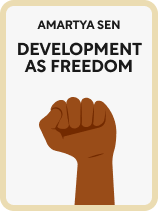

This article is an excerpt from the Shortform book guide to "Development as Freedom" by Amartya Sen. Shortform has the world's best summaries and analyses of books you should be reading.
Like this article? Sign up for a free trial here .
What’s Amartya Sen’s approach to development? Why does he believe an income-centered approach to poverty is harmful?
According to Sen, development is the process of expanding human freedom. A country’s growth and stability rely on the rights of its citizens and their well-being, rather than the wealth of its people.
Here’s more of Amartya Sen on development, described in his book Development as Freedom.
Amartya Sen on Development: His Philosophy
In redefining development as freedom, Amartya Sen takes a holistic view of poverty and characterizes it as impeding people’s ability to lead the lives they want.
Most definitions of poverty are based only on level of income. However, Amartya Sen’s approach to understanding poverty is more nuanced. Income alone does not tell the story of well-being, according to Amartya Sen. On development, Sen says the economy would flourish if more people had opportunities and freedom.
Sen contends that income and wealth are only important as a means to something else, not for their own sake. As such, poverty is about more than low income; it’s about a lack of opportunity. Conversely, development is about more than simply increasing wealth; it’s about increasing opportunity.
Sen contends that poverty is harmful and unjust because it deprives people of the ability to lead the lives they want, and development is valuable because it allows people to improve their lives as they see fit.
Amartya Sen’s Development as Freedom
According to Amartya Sen, development is the process of expanding the freedoms that people can exercise.
In contrast, most modern economic literature takes the “income-centered approach” to poverty and economic development. Most analyses by economists and policymakers view per-capita income and GDP growth as the keys to prosperity. However, Sen argues this approach is actually a deviation from the emphasis early economists put on a more holistic approach to development.
Aristotle stated that wealth is only valuable insofar as it could be used to achieve other objectives, such as “capacity” and “flourishing.” Adam Smith, considered the founder of economics, often prioritized living conditions rather than mere income. The pioneering work of economists and mathematicians like Sir William Petty and Joseph-Louis Lagrange paid similar attention to what could be achieved with income.
In line with this classical view, Sen makes both a philosophical and empirical case for why poverty and development ought to be considered through a freedom-focused approach.
Explaining Freedom
Now that we’ve established the basis for redefining poverty as deprivation of opportunities and development as freedom, we’ll examine what specifically Amartya Sen means when he refers to freedom. Amartya Sen’s is a more expansive view of freedom than traditional definitions, including both negative rights (such as freedom from coercion) and positive rights (such as the right to education and health care).
Amartya Sen argues that these freedoms are both the primary purpose of development, as well as the most effective means of development. Sen cites five types of freedoms that advance a person’s potential:
- Democratic rights
- Commercial liberties
- Public provisions
- Ethical guardrails
- Safety nets
The Problem With Focusing on Income
Sen contends that focusing on income to assess development doesn’t fully reflect people’s welfare or well-being and that consideration of freedom provides a more well-rounded picture.
Sen views income-centered development as inadequate because it overlooks aspects of welfare that people value. Here are three oversights of the income approach:
- Varying effects of GDP on health
- Social costs that persist even with income transfers to the poor
- The possibility that overall welfare may improve without strong GDP growth
The Role of the Market in Development
Markets are integral to Amartya Sen’s theory of development because they afford basic freedoms and spur economic growth. Sen argues that markets have both intrinsic and instrumental value, but also shortcomings. He explores both benefits and flaws in this chapter.
Sen identifies two reasons why free markets are integral to his view of development:
1. As a means to economic growth and progress: Sen acknowledges that free markets can increase economic growth and overall economic progress. However, Sen says free markets are much more than just a means to improve prosperity.
2. As a fundamental freedom that people have reason to value: Independent of its impact on economic growth, the freedom to exchange goods and services is a basic part of social interaction and is valuable as its own kind of freedom.
Nonetheless, Sen takes care to enter into his calculus the aspects of free markets, such as income and gender inequality, that may contribute to the systematic exclusion of some marginalized groups. He also favors government intervention like social support and regulation when they can improve overall welfare.

———End of Preview———
Like what you just read? Read the rest of the world's best book summary and analysis of Amartya Sen's "Development as Freedom" at Shortform .
Here's what you'll find in our full Development as Freedom summary :
- The five types of freedom that are integral to economic development
- How democracy can prevent famine
- How empowering women helps communities






